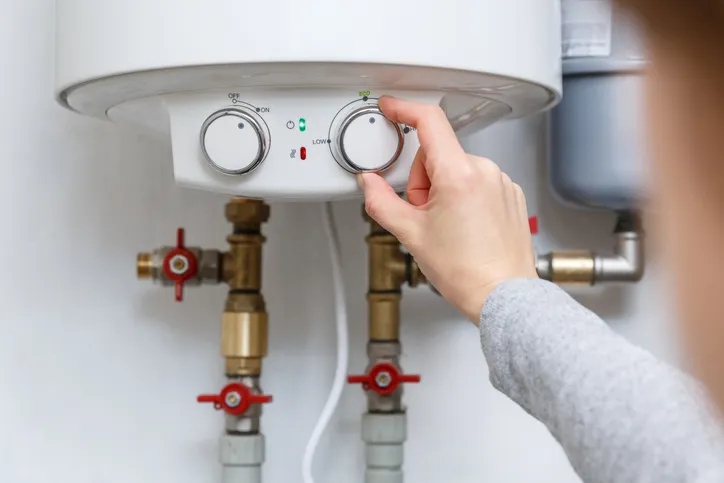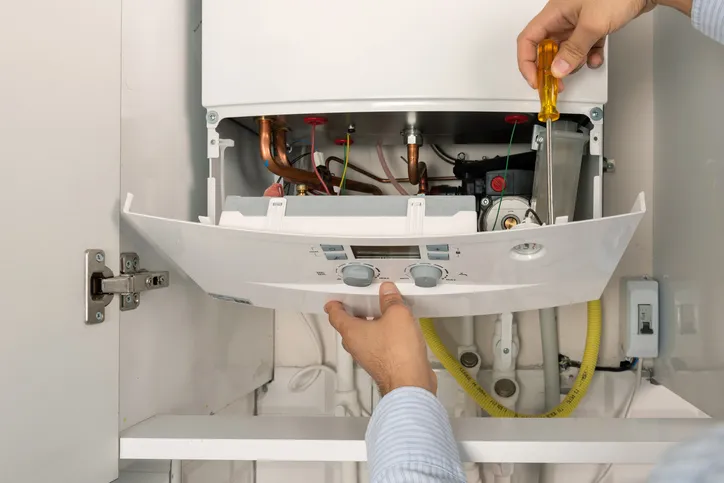Water Heater Installation in Malibu, CA
Serving Ventura & Sacramento Counties

Choosing the right water heater for your Malibu home affects comfort, energy bills, and long-term reliability. Coastal exposure, hillside properties, and variable household hot water needs make professional guidance essential. This page explains your installation options—tank versus tankless—sizing, fuel choices, removal and disposal of existing systems, the typical installation process and safety checks, expected performance, and common warranty and financing considerations specific to Malibu, CA homes.
Why installation matters in Malibu, CA
Malibu’s coastal climate exposes equipment to salt air and higher corrosion risk. Many homes are on steep lots with tight mechanical spaces and may require seismic strapping and special vent routing. Entertaining homes and multi-bath residences often need higher hot water capacity or faster recovery. Local building codes and permit requirements in Los Angeles County and Malibu also affect placement, venting, and installation methods. Selecting the right system for these constraints prevents premature failure and costly replacements.

Tank vs Tankless: which is right for your Malibu home
- Tank water heaters (storage)
- Pros: Lower upfront cost for the unit, simpler installation in many cases, predictable supply for multiple simultaneous users.
- Cons: Larger footprint, standby heat loss, shorter typical lifespan (8 to 12 years) especially in salty coastal air unless using corrosion-resistant components.
- Best for: Homes with intermittent high simultaneous demand such as multiple bathrooms running at once, or where electrical service is limited.
- Tankless water heaters (on-demand)
- Pros: Compact, energy efficient for many households, longer lifespan (15 to 25 years) with proper maintenance, offers endless hot water at rated flow.
- Cons: Higher upfront cost, may require gas line or electrical upgrades, performance impacted by water hardness and high simultaneous demand without multiple units.
- Best for: Smaller households, long narrow homes where space is premium, or homeowners prioritizing energy savings and continuous hot water.
- Hybrid heat pump water heaters and solar-compatibility
- Hybrid heat pump units can offer excellent efficiency when space and ambient conditions allow. Malibu homes with existing solar arrays can pair solar thermal or PV-compatible electric systems for lower operating costs. Consider shading, attic or garage space, and venting needs.
Sizing considerations for Malibu homes
Correct sizing ensures reliable hot water without overspending on capacity.
- For storage tanks: use First Hour Rating (FHR) which estimates how much hot water the unit delivers in an hour. Match FHR to peak morning or evening usage (multiple showers, dishwasher, laundry running).
- For tankless: size by required flow rate in gallons per minute (GPM) and the temperature rise needed. Coastal Malibu water tends to have milder inlet temperatures than inland, lowering required temperature rise slightly in winter—but always calculate based on actual inlet temp.
- Factor in:
- Number of bathrooms and typical simultaneous use
- Appliances like hot tubs or large dishwashers
- Future household changes (additions, rentals, guest houses)
Fuel sources and infrastructure
- Natural gas: Common in many Malibu neighborhoods. Offers strong recovery rates and reliable performance for tank systems and high-capacity tankless units. Venting and combustion air must meet code.
- Propane: Used where natural gas is unavailable. Requires proper tank sizing and regulator sizing for high-demand units.
- Electric: Easier to install but may have higher operating costs depending on rates. Hybrid heat pump units can be much more efficient than conventional electric tanks.
- Solar integration: Solar thermal or PV systems can reduce operating costs. Tank systems pair naturally with solar thermal; tankless units can work with PV-driven electric or hybrid setups with careful design.
Removal and disposal of existing units
Removal of an old water heater includes: draining and disconnecting, capping gas or electrical feeds, and safe transport for recycling or disposal. Malibu and California regulations require responsible disposal of refrigerants and certain materials and may impose fees. Salvage of the anode rod or recycling of metal components reduces landfill waste. Proper disconnection prevents leaks and ensures the system is ready for replacement.
Typical installation process and safety checks
- Pre-install inspection
- Evaluate location, venting options, gas or electrical capacity, seismic bracing needs, and water quality.
- Permits and code compliance
- Pull required permits and plan for an inspection to meet local building rules.
- Removal of old unit
- Drain, disconnect, and remove old equipment; dispose per regulations.
- Rough-in and connections
- Install appropriate venting for gas units, upgrade gas or electrical supply if needed, add thermal expansion tank on closed systems, and install necessary water shutoffs.
- Mounting and seismic strapping
- Secure tanks and tankless indoor components to resist movement during earthquakes; ensure outdoor units are corrosion-resistant or protected.
- Safety devices and commissioning
- Install and test temperature and pressure relief valve, check for gas leaks, verify proper vent draft and combustion air, set thermostat to a safe default (commonly 120 F), and install anti-scald mixing valves if required.
- Final inspection and performance test
- Confirm expected flow rates, recovery time, and that discharge from T&P is routed safely.
Expected performance and lifespan
- Tank heaters: Expect 8 to 12 years, shorter in salty coastal environments unless using stainless or specially coated tanks and regular anode maintenance.
- Tankless heaters: Expect 15 to 25 years with routine descaling in hard water areas and proper venting. Performance stated as GPM will be reduced if multiple fixtures run at once unless using multiple units.
- Efficiency: Tankless and hybrid units typically provide higher energy efficiency. Proper insulation of hot water lines and routine maintenance help realize projected savings.
Maintenance and common Malibu-specific issues
- Salt air corrosion: Choose corrosion-resistant venting and exterior-rated components for any outdoor-facing installations.
- Hard water scaling: Malibu water hardness varies by area; tankless systems are particularly sensitive. Install water softening or schedule regular descaling to protect heat exchangers.
- Seismic readiness: Ensure strapping and rigid connections where required by local code.
- Venting and rooftop installations: Coastal winds and hillside rooflines may require specialty vent flashings and routing.
Warranties and financing
- Manufacturer warranties vary by model and component. Typical tank warranties range from 6 to 12 years on the tank, while tankless manufacturers often offer extended warranties on heat exchangers. Labor warranties depend on the installer.
- Look for comprehensive coverage that includes parts and labor for a defined period and ask about prorated versus non-prorated terms.
- Financing and payment plans are commonly offered for larger installations and upgrades. Options may include longer-term payment agreements with a soft credit check during prequalification. Review terms carefully including interest rates, repayment period, and any deferred interest clauses.
What to expect after installation
A properly installed water heater should provide consistent hot water at the expected flow rates, operate safely without gas leaks or unusual noises, and pass the municipal inspection. Expect a brief demonstration of temperature controls and maintenance recommendations. Regular annual or biannual checks extend service life and maintain efficiency.
Choosing the right water heater for a Malibu home means balancing immediate needs, local environmental factors, and long-term reliability. With the right sizing, corrosion-resistant components, proper venting, and adherence to local code and seismic guidelines, your new system will deliver safe, efficient hot water tuned to life on the coast.
Enjoy Reliable Hot Water with a Professional Installation
The right water heater transforms daily comfort while protecting your home from unexpected failures. With AirWorks Heating Air Plumbing, every installation is designed to handle Malibu’s coastal challenges—salt air corrosion, hillside plumbing, and strict efficiency codes—so you get dependable performance and long-lasting value.
Upgrade with confidence today—contact us to schedule your water heater installation in Malibu, CA and enjoy consistent, efficient hot water for years to come.


